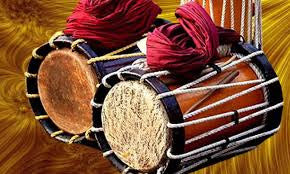
The Chenda: Heartbeat of Malayali Culture
Share
Among the many elements that define Kerala’s rich cultural tapestry, the Chenda stands out as more than just a musical instrument—it is the heartbeat of Malayali tradition. From temple festivals to classical performances, the rhythmic beats of the Chenda have become synonymous with celebrations, rituals, and the communal spirit of Kerala. For the Malayali, the Chenda isn’t just an instrument; it is a reflection of heritage, pride, and identity.
A Glimpse into the Chenda’s Origins
The Chenda is a cylindrical percussion instrument made from the wood of the jackfruit tree, with one side covered by animal skin that is beaten with sticks. It has been an integral part of Kerala’s cultural scene for over 300 years, but its roots likely stretch back even further. The instrument is primarily associated with temple rituals and traditional art forms like Kathakali, Koodiyattam, and Theyyaattam.
In the early days, Chenda players were typically members of temple communities, and their role was to accompany religious ceremonies, adding a dynamic and spiritual dimension to the events. Today, the Chenda has transcended its religious origins and is featured in various performances, festivals, and even modern music, symbolizing the adaptability and relevance of Kerala’s traditional instruments.
Chenda Melam: The Sound of Celebration
One of the most iconic uses of the Chenda is during a Melam, a traditional ensemble of percussion instruments performed during temple festivals and processions. The Chenda Melam is a powerful and exhilarating performance, usually led by hundreds of skilled drummers who create an energetic rhythm that resonates with the very soul of the audience.
Panchari Melam and Pandi Melam are two popular types of Chenda Melams. Both are performed at festivals, especially at temple celebrations like the Thrissur Pooram, which is Kerala’s most famous and largest temple festival. At such events, the Chenda, along with other instruments, sets the stage for grand displays of cultural pride, and the beats often leave both locals and tourists entranced.
In essence, the Chenda Melam is not just a musical performance—it is a communal celebration that binds people together in rhythm, invoking a sense of unity and collective joy that only such powerful beats can create.
Chenda and Classical Art Forms
The Chenda is also deeply connected to Kerala’s classical dance forms like Kathakali and Koodiyattam. During a Kathakali performance, the Chenda sets the tone for dramatic moments and heightens the emotions portrayed by the dancers. The vigorous and often dramatic beats mirror the intense storytelling of Kathakali, making the instrument a key player in the performance. Similarly, the Chenda is a crucial component in Koodiyattam, the Sanskrit theater form recognized as a UNESCO World Heritage art.
In both Kathakali and Koodiyattam, the Chenda plays a dual role—providing rhythm and enhancing the emotional depth of the performance. The beats become part of the narrative, guiding the dancers and the audience through the complex layers of the story being told.
The Malayali and the Chenda: A Bond That Transcends Time
For the Malayali people, the Chenda is more than an instrument; it is a cultural symbol that has stood the test of time. From the moment a child in Kerala hears the pulsating beats of the Chenda during temple festivals, there is an unspoken connection that forms. For generations, families have passed down the art of Chenda playing, ensuring that the younger generation continues to embrace and preserve this essential part of their heritage.
Even today, learning the Chenda is considered an honorable skill, with dedicated schools and communities that offer training. Chenda masters or “Chenda Ashans” are revered figures in society, respected not only for their musical talents but also for their commitment to keeping the tradition alive.
The Chenda continues to be part of important life events in the Malayali community. From weddings to religious festivals, its presence signifies a deeper spiritual and cultural resonance. The sound of the Chenda is a reminder of the roots of tradition, the rhythm of life, and the heart of the Malayali people.
Chenda in Modern Times
While the Chenda is most often associated with traditional performances, it has also found a place in contemporary music and fusion genres. In recent years, Kerala’s young musicians have experimented with integrating the Chenda into modern formats, blending its distinctive sound with rock, jazz, and electronic music.
The Chenda has appeared in both regional and national films, with its powerful beats adding intensity and authenticity to key scenes. It has also become a symbol of Kerala’s cultural richness in cultural festivals across India and the world, where Malayalis showcase their heritage through the electrifying rhythms of the Chenda.
Grameen Craft’s Commitment to Culture
At Grameencraft, we believe in preserving and promoting Kerala’s rich cultural heritage, and we proudly support the Chenda as a symbol of our commitment. As an organization dedicated to eco-friendly and traditional crafts, we recognize the Chenda’s role not only as an instrument but as a cultural treasure that must be preserved for future generations.
Through our platform, we aim to support the artisans, performers, and communities that keep Kerala’s cultural traditions alive. Our contributions help ensure that the art of Chenda playing continues to thrive, sustaining its role in festivals, rituals, and everyday life. Just as we promote eco-friendly handicrafts, we believe in promoting Kerala’s intangible cultural heritage, such as the Chenda, which resonates deeply with both locals and tourists alike.
The Eternal Beat of Kerala
In a world where traditions are rapidly changing, the Chenda remains a steadfast symbol of Malayali culture and identity. Its rhythm echoes through the temples, streets, and hearts of Kerala, forging a deep connection between the past and the present. Whether it is performed in a grand Melam at a temple festival or featured in a modern music concert, the Chenda carries with it the rich legacy of the Malayali people, ensuring that its powerful beat will continue to resonate for generations to come.